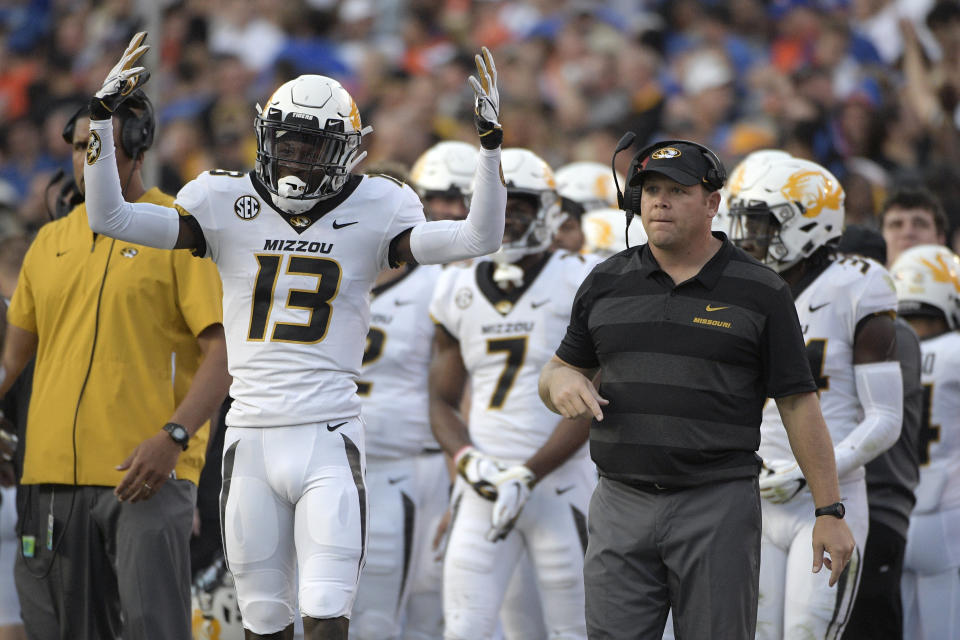In NCAA appeal, Missouri says 'overly harsh' sanctions could have 'chilling effect' on future cases
Missouri has formally filed an appeal of the sanctions it was given by the NCAA back in January.
Missouri’s football program was hit with a postseason ban as the result of a former athletic department tutor completing coursework for 12 student-athletes, including multiple football players. Additionally, the football program is facing scholarship reductions, recruiting restrictions and will be forced to vacate wins — if the penalties stick.
In a 64-page appeal filed with the NCAA’s Appeals Committee on Monday, the school argued that the penalties it received were “contrary to NCAA case precedent,” “not supported or appropriate given the nature of violations” and could “have a chilling effect on future NCAA enforcement processes.”
In a news release detailing the appeal, the school said the sanctions it received were “overly-harsh.”
"We believe that the penalties our programs received were a clear abuse of the Committee (On Infraction)'s discretion based upon existing NCAA bylaws. Our staff and legal team have worked tirelessly to research and develop a well-written appeal that accurately reflects our position," Missouri athletic director Jim Sterk said in the release.
From this point, the Committee on Infractions has 30 days to respond to the appeal. At a later date, the school will be granted an in-person hearing to further argue its case before the NCAA Appeals Committee.

Why was Missouri hit with NCAA penalties?
Back in November 2016, a former Missouri tutor named Yolanda Kumar revealed in a Facebook post that she “participated in academic dishonesty,” including completing “entire courses” for student-athletes. Kumar later told the Kansas City Star that she was “groomed” to help athletes stay eligible and “felt harassed” to help athletes with their work while staying in regular contact with academic coordinators.
Her public comments put the situation on the NCAA’s radar. More than two years later, on Jan. 31, the NCAA announced penalties for Missouri. Some of the NCAA’s findings corroborated Kumar’s statements. For instance, the NCAA said she “completed an entire course” for one football player and “assisted” two football players with the “completion of Missouri’s math placement exam.” The school’s baseball and softball programs were also sanctioned in the case.
“Simply put, 12 student-athletes did not complete their own work,” the NCAA Committee on Infractions said.
Missouri cooperated with the NCAA throughout the case and agreed that a Level I violation took place, a move that backfired. After the penalties were announced, Dave Roberts of the Committee on Infractions said that Missouri’s forthcomingness actually contributed to the severity of the penalties.
"A message is sent to the membership every time the NCAA Committee on Infractions adjudicates cases,” Sterk said. “In this instance, the message is loud and clear that neither proactive self-reporting nor exemplary cooperation is of any value to the committee. I am shocked this is the message the NCAA wants to send to its membership in today's climate.”
Missouri quickly fought back against the NCAA
As soon as the sanctions were announced, Missouri went on the offensive with various officials calling out the NCAA. Chancellor Alexander Cartwright called the ruling “harsh and inconsistent.” Sterk vowed to “aggressively fight” the ruling and said the Committee on Infractions “abused its discretion.” Barry Odom, the school’s football coach, said the penalties were “completely unjust and unfair.”
“There’s not anybody sitting around saying poor, pitiful Missouri. I guarantee you,” Odom said. “Bring it on.”
Odom said that no players on his current roster were involved with the penalties and questioned the intent of the NCAA — especially with respect to the recruiting sanctions.
“It had zero to do with recruiting infractions. You talk about loss of scholarships, that’s affecting kids’ lives,” Odom said.
The sanctions also left Odom with the responsibility to recruit his own roster to stay at Missouri. Anytime a program is hit with a bowl ban, the NCAA leaves the door open for that school’s seniors to transfer without penalty. In February, Odom said his players were being “contacted and bombarded non-stop” by other schools. Odom said some coaches were talking to his players “daily.” He even singled out Tennessee in an interview with CBS.
So far, the Missouri roster has remained intact.
"We will continue to work diligently to make this situation right for our student-athletes, coaches and fans who are impacted by these penalties as they now stand,” Sterk said.
More from Yahoo Sports:

